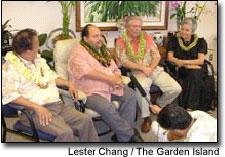WAILUA — The sale of the old Coco Palms has been completed, opening the way for the demolition of what was the flagship Polynesian-style hotel in Hawai’i in the 1950s and the rebuilding, as much as possible, of a new
WAILUA — The sale of the old Coco Palms has been completed, opening the way for the demolition of what was the flagship Polynesian-style hotel in Hawai’i in the 1950s and the rebuilding, as much as possible, of a new resort in the style and grace of the old one, top government and business representatives have announced.
The hotel has been closed since 1992, when Hurricane ‘Iniki raked the island, causing more than $1 billion in damages to properties, including the hotel.
The hotel wields local and international prominence because it was home to Queen Deborah Kapule, Kaua’i’s last reigning queen, and was the site of the famous wedding scene in Elvis Presley’s film “Blue Hawaii,” produced in 1961.
The old hotel will be “replicated” in the planning for the new project, said Richard Weiser, one of the key principals for Coco Palm Ventures.
“The name of the game was to bring back as much of the memory of that grand hotel resort,” Weiser said. “(There will be ) four stories in the front … same footprints. Building sizes are basically the same, although there will be some larger units,” he said.
The price of the sale to a San Francisco interest was not disclosed.
Work on the $220 million project is expected to start this summer, followed by a grand opening scheduled for the summer of 2008, Weiser said.
The project will boast 48 bungalows, although the company has county approvals to build 104 hotel units instead, and 196 luxury condominium units.
The condominium units will be sold and will not be used as timeshare units, according to Kaua’i real estate broker Donna M. Apisa.
Apisa’s company, Ocean-front Realty International Inc., located at the Princeville resort, will have exclusive selling rights for the condominiums.
The hotel will also feature a spa and spaces for restaurants and an overhead footpath that will run between the hotel and Wailua Bay.
The deal involved the purchase of 16. 4 acres that are privatelyowned and the transfer of 17 acres of state leasehold lands, on which are found Hawaiian artifacts that Weiser’s group has promised to protect.
Avery Youn, a Kaua’i architect who is part-Hawaiian, had pressed the new owners to protect the finds, and negotiated an agreement that would allow Hawaiians and residents to use the hotel grounds.
In anticipation of the start of the project, Baptiste said he and members of his administration worked with the state Department of Transportation and Weiser’s group to widen parts of Kuhio Highway from the southern entrance of the temporary Kapa’a Bypass Road and the Wailua Bridge, which spans the Wailua River.
In line with plans put forth by the developer to widen the highway in front of the hotel, utility lines will be placed underground, Baptiste said.
Plans also call for widening a former northbound, one-lane, cane bridge into two lanes, with a bicycle lane to be added, Baptiste said.
The cane haul bridge sits immediately makai or to the ocean side of the existing Wailua Bridge.
Weiser thanked Baptiste for spearheading efforts to make the road improvements, there-by helping to move the hotel reconstruction project along.
The widened road should help to facilitate morning and evening traffic through Kapa’a town, which lies in a road corridor that is one of the busiest on the island.
For the hotel reconstruction project, Weiser said much of the company’s vision “all along has been to continue the hospitality legacy that Grace Guslander created 53 years ago.”
Baptiste, who attended the news gathering, said he and many other Kauaians eagerly await the reopening of the hotel.
“We are here to celebrate and also inaugurate the rebirth, the rebuilding of the Coco Palms, something that has been long-wanted by the people of Kaua’i, and something that will make us whole after Hurricane ‘Iniki, (as the old Coco Palms is) the last hotel to be rebuilt and (put) back in service,” Baptiste said.
Weiser said Larry Rivera, who first began performing at the old Coco Palms more than 50 years ago, will always have a home at the hotel.
Rivera, who, along with his family, stage the “Blue Hawaii” wedding in a lagoon at the hotel, was asked by Weiser to create a new song for the hotel.
Rivera said “Coco Palms Hotel has a million stories to be told. So much memories for people from all over … I believe we will create new memories that will last forever.”
Former Mayor Maryanne Kusaka, who was a singer at the old hotel for a time and who has been hired as a consultant by Weiser’s group, said the hotel will be able to compare favorably against the finest hotels in the world.
“The whole resort will be ultra-Polynesian,” she said. “It will be the remaining Native Hawaiian property in all of Hawai’i.”
Also attending the meeting was Mike Swanson, the development manager for the project.
- Lester Chang, staff writer, can be reached at 245-3681 (ext. 225) and lchang@ kauaipubco.com.


